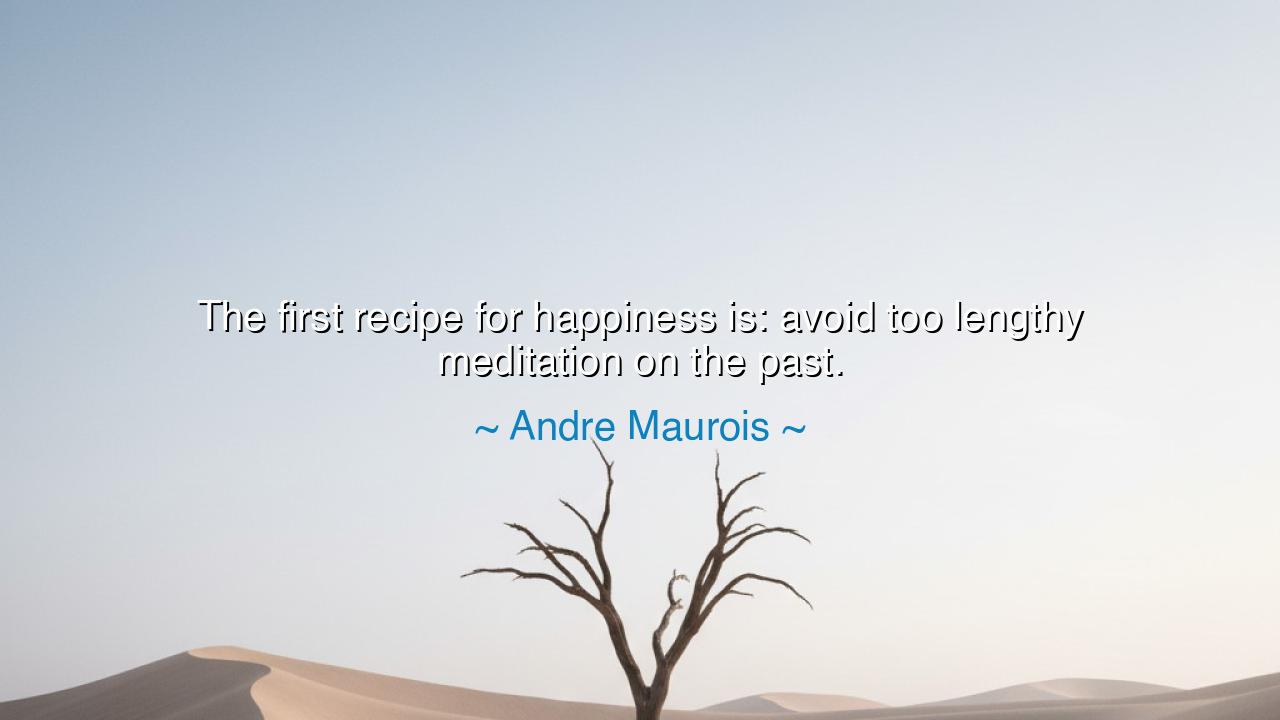
The first recipe for happiness is: avoid too lengthy meditation






Hear now the quiet but enduring wisdom of André Maurois, the philosopher of reflection and restraint, who wrote: “The first recipe for happiness is: avoid too lengthy meditation on the past.” Within this gentle counsel lies a truth as deep as time itself. Happiness, he teaches, is not found in endless remembering, nor in the constant turning of one’s gaze backward. It lives instead in the present — in the fresh air of now. The past, though rich with lessons, can also become a shadow that dims the soul. To dwell too long upon it is to lose the light of today.
André Maurois, born Émile Salomon Wilhelm Herzog, was a French biographer, philosopher, and soldier who lived through the storms of two world wars. He saw nations torn by regret, men haunted by what they could not change, and societies weighed down by nostalgia and grief. Out of this experience, he spoke the truth of one who had seen both the beauty and the burden of memory. His words remind us that reflection has its place, but obsession steals peace. The mind must learn to bow before time — to honor what has been without allowing it to rule what is.
To meditate on the past is natural; to live in it is perilous. The mind, like a traveler, must rest sometimes at old crossroads, but it cannot build its home there. For the past is unchanging — a river whose waters have already flowed. To stare into it too long is to mistake stillness for depth and sorrow for wisdom. Happiness cannot grow in the soil of what has already died. It must take root in the living moment, watered by gratitude, nourished by the courage to begin again.
Consider the story of Nelson Mandela, who spent twenty-seven years in imprisonment. When he emerged, he could have looked back in bitterness, nursing the wounds of injustice. Yet he chose instead to walk forward in peace. He once said, “As I walked out the door toward the gate that would lead to my freedom, I knew that if I didn’t leave my bitterness and hatred behind, I’d still be in prison.” Mandela understood what Maurois meant: to hold on to the past is to remain captive to it. To release it — even with scars — is to step into the light of freedom.
This wisdom is not an invitation to forget, but to forgive — to let memory serve growth rather than grief. The ancients, too, knew this. The Stoics taught that time is beyond our command and that peace lies in focusing on what can still be shaped. Seneca wrote, “No man can have a peaceful life who thinks too much about lengthening it, or who measures every moment by memories of the past.” The same applies to happiness: it vanishes when we measure the present against what once was. The heart that is full of yesterday has no room for today’s blessings.
Yet how many of us live bound by the ghosts of old errors and lost joys? We replay words we cannot unsay, choices we cannot unmake, faces we can no longer see. We carry the past like a burden across our shoulders, wondering why we cannot rise. But Maurois calls us to courage — to set down that weight, to trust that what is gone has served its purpose. Every sorrow has given its lesson; every joy, its light. To meditate too long upon them is to chase the echo instead of the song.
So, my child, take this teaching into your heart: learn from the past, but do not live in it. When memory arises, honor it — but let it pass like clouds across the sky. Do not let remorse steal your peace, nor nostalgia blind you to the beauty that stands before you. Practice gratitude for what has been, and faith for what will be. The recipe for happiness is not complicated: it is simply to dwell fully where you are — neither ahead in fear nor behind in regret.
Thus spoke André Maurois, the wise observer of time and temperament: “The first recipe for happiness is: avoid too lengthy meditation on the past.” His words are a call to awaken. Look forward with hope, live now with purpose, and remember that the past, though part of you, is not your master. Happiness belongs to those who, with gentle strength, close the book of yesterday — not in denial, but in peace — and step into the radiant chapter of today.






AAdministratorAdministrator
Welcome, honored guests. Please leave a comment, we will respond soon